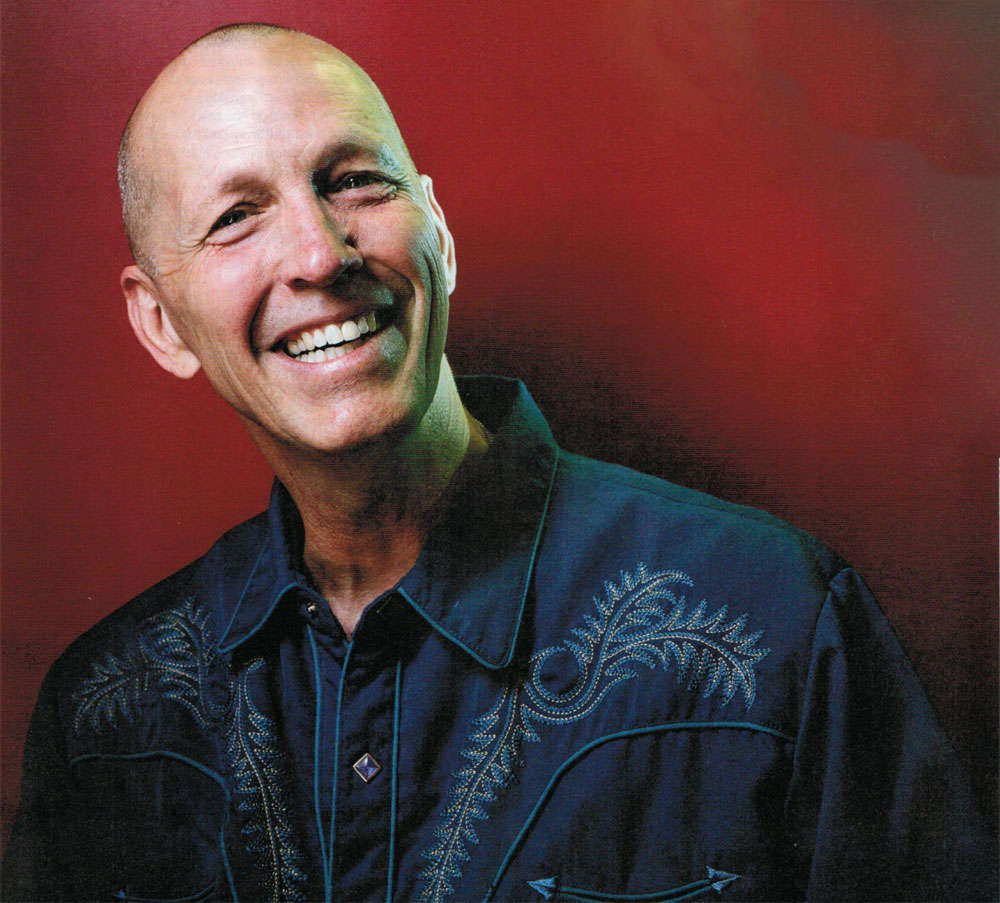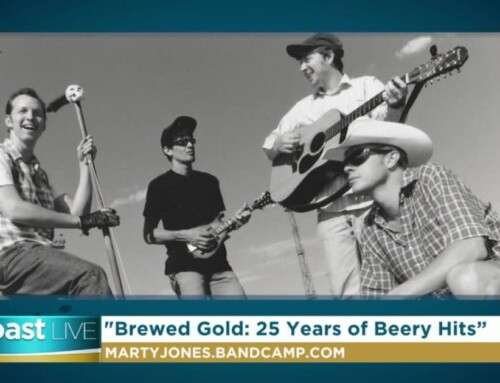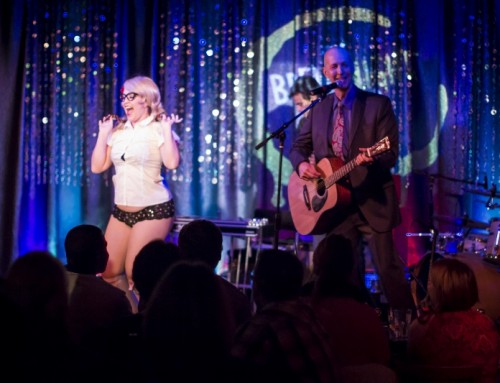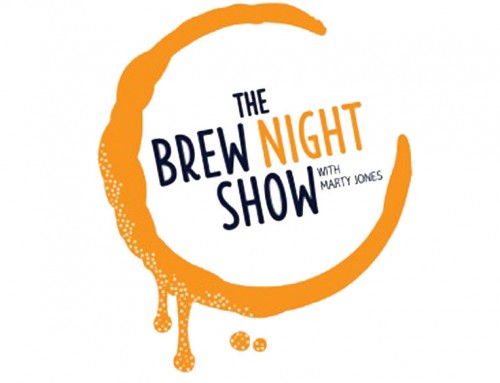Jest of Life: Marty Jones is Brewing’s Best Behind-the-Scenes Promoter.
On April 1, 2012, Denver’s Wynkoop Brewery announced a novel beer style. In the accompanying video, pitchman Marty Jones — tall and string-bean straight, runner lean, head shaved smooth, grinning like a late-night infomercial salesman — detailed Rocky Mountain Oyster Stout. It contained Colorado’s indigenous “oysters” (aka bull testicles) and delivered flavors of chocolate, coffee and, yes, nuts. “Have a ball,’ Jones country-crooned off-camera, accompanied by twanging guitar.
“People came into the pub wanting to drink the beer, not knowing it was a joke,” Jones says of his April Fools’ Day spoof. It later became a reality (sold by the twopack, naturally) and garnered global media attention, with Anderson Cooper and Kathie Lee Gifford sipping the ballsy stout on TV. “I’m a big fan of humor and its power to push things,” Jones says. “This is the beer business, but it’s also the entertainment business.”
Few PR pros have injected more mirth and memorable catchphrases into beer than Denver’s Jones. The musician and pitchman coined slogans for Great Divide (“Great Minds Drink Alike”) and New Belgium (“Contents Under Pleasure”); worked as the Great American Beer Festival’s publicity consultant, escalating it into a sold-out sensation; and ballooned Oskar Blues’ small-potatoes mission to can its pale ale, two at a time, into the “canned beer apocalypse” that’s reverberated countrywide. “My goal is to make my customers famous and get their stories out,” Jones says.
Jones is an unflagging flag-waver who rarely waves his own. “There are brands of beer, but when people say their ‘brand’ — that’s what you burn into a cow,” Jones says, his drawl warm and measured, betraying his Virginia roots.
He grew up in Norfolk and attended Old Dominion University, making A’s his first year, flunking out the second. “I chased women and played in bands and drank like every college student,” Jones explains. He played harmonica with his brother in a musical-parody group, which included a turn as Elvis
Presley’s illegitimate child; he met his wife, Lisa, after performing “Heartbreak Hotel.”
“For some reason she thought I was charming in a lab coat and pompadour, singing silly Elvis parodies.” Jones recalls, laughing.
After dropping out he picked up a guitar, and later moved in with Lisa; eventually he grabbed his community-college degree and returned to ODU to complete his undergraduate degree. Between classes, he would play his harmonica in a school stairwell, the melody piquing a writing professor’s curiosity. “You should look into my class,” he told Jones, who soon signed up for Feature Writing 101. Jones was keen on homebrewing, cooking pale ales and hoppy beers, stoked by his Ballantine IPA love. He wrote what he lived and placed a beer article in a local publication, which led to a weekly beer column for the school paper.
It was the early 1990s, an era with just 300-odd American breweries. “The hard part was finding anything to write about,” says Jones, who covered homebrewing and beer releases. He and Lisa married in 1991, and he homebrewed Connubial Bliss Stout to be served at the wedding (“It was very prophetic and telling,” he says), which was chased by a beer-drinking GABF honeymoon. Jones graduated in 1995, and as the couple clinked beers in the bathtub one evening, Lisa asked Marty to move to Denver to be closer to her family. Colorado’s beer scene was cranking with New Belgium, Odell, Great Divide and Boulder Beer. “My goal was to make a living writing and be part of the beer culture,” he says. He covered beer for Denver Sidewalk, a kind of Yelp precursor, and music for alt weekly Westword.
He also played music with his beer-soaked, honky-tonking group, Marty Jones & the Pork Boiling Poor Boys (sample songs: “One More Beer” and “I’ll Have Another One”). He pitched a Nashville publicist to promote their record. “That’s the best pitch I’ve ever had from a band,” she wrote. “You should be a publicist.’
Jones, who’d taken a PR class in college, offered his services to then-embryonic Great Divide. “He’s got a way with words and he loves beer, and we thought that was a great combination to help convey our message,” recalls founder Brian Dunn, who knew Jones from his brewery visits. Jones cooked up “Great Minds Drink Alike,” still used to this day. “We really connect with the slogan,” Dunn says. “It’s a very strong part of our branding.”
Jones penned press releases and helped with bottle-label text for Great Divide and did copywriting for New Belgium, his passion instrumental in articulating impactful messages. “I was a beer fan, so I was corning at it from a believer perspective,” he says. Every beer-PR gig made his day job just a little tougher: As a journalist, he couldn’t write about his brewery employers. “If you worked for Great Divide, there was one-fifth of Denver’s brewers,” Jones says. Then along came Oskar Blues.
In 2002, the Lyons, Colorado, brewpub decided to can Dale’s Pale Ale, their aggressively bittered pale ale. “It was such a far fetched idea;” says founder Dale Katechis. “I was looking for someone who was energetic and in the craft-beer scene.” That described Jones to a T. The original plan, Jones recalls, was to draw locals from Longmont and Boulder. “My idea was to say, “No, this is a much bigger story,” Jones recalls. While researching, he realized that Oskar Blues was the first U.S. craft brewery to brew and hand-can its beer, a potential revolution bubbling in the beer aisle.
“We made it our mantra that we were a tiny brewery with a big idea, and we were out to overthrow the status quo,” says Jones, who coined the slogan “Canned Beer Apocalypse.” (“That’s an irresistible story,” he says.) Jones shipped cans to The New York Times, which dubbed Dale’s its top American pale ale in a 2005 tasting. He became Oskar Blues “lead Singer” and “idea man,” evangelizing for canned craft beer. “Instead of buying ads and traditional marketing, we decided to spend our money on telling our story,” Katechis says. “Marty was such a great storyteller.”
After seven years at Oskar Blues, Jones left to revive Wynkoop’s reputation. “Marty had a challenge,” says Denver beer journalist Eric Gorski. “In this era where everyone wants to taste the next cool thing from the brewery that just opened, how do you stand out and how do you get heard?”
To alter perceptions of Colorado’s oldest brewpub, Jones renamed the British-style IPA and milk stout to London Calling and Cowtown Milk Stout (using a derogatory Denver nickname), leading to a sales surge of nearly 50 percent. He christened Belgian-style Belgorado, made with Colorado grown ingredients, and Hickenlooper’s Inaugurale, honoring Wynkoop co-founder turned Colorado governor John Hickenlooper. Jones also delivered Wynkoop beer by horse-drawn wagon (also used to transport Hickenlooper to his inaugural ball) and organized and emceed the brewery’s annual Beerdrinker of the Year competition, in which robed judges wear wigs and contestants sweet-talk beer.
Humor laughed alongside inspiration, most notably one day in 2012 when Jones appeared on a radio show, sipping a Colorado oyster stout. It seemed odd — shouldn’t the beer be more … native? “On the way home I was driving and writing with my right hand — I’m left-handed — scribbling notes for the video script,” Jones recalls of what became Rocky Mountain Oyster Stout. “It was ridiculous and funny and kind of offensive,” The attention-wrangling stunt harked back to history’s timeless, peerless hucksters. “Marty is the P.T. Barnum or Bill Veeck of beer marketing,” Gorski says. “He’s got this great ear and great awareness for what will grab people’s attention.”
Jones left Wynkoop in 2013 to lend his results-driven comedic touch to other clients. For canning company Cask Brewing Systems, where he still works today, he created April Fools’ Day hoaxes for the “self-refilling beer can” and “cag” — a can-shaped keg with a tap. He launched Mission Brewery’s quart “cannons” of imperial IPAs, spearheaded West Flanders’ Recreational Smoke (brewed to honor Colorado’s legalization of marijuana and released at 4:20 p.m.) and turned flood-ravaged Spirit Hound Distillers’ misfortune into fortune. “I hung the term ‘flood-proof whiskey, ” Jones says. “It provides a nugget, something that makes it different.”
Jones continues to operate differently. A life-threatening blood clot in 2007 was a pants-kicking reminder to cherish every day, so he goes fishing one morning each week. During the GABF he hosts “The Brew Night Show with Marty Jones,” a beer-themed variety show. He’s returned to music with vigor (“No beer has ever made me cry, but many a song has put tears of joy on my face,” he says), playing both solo and with his band, the Great Unknowns, and with the beer-based group The Gourdians. (The occasional group stars Stone’s Greg Koch, playing songs like “Enter Beer Man,” a take on Metallica’s “Enter Sandman.”)
Jones is also returning to his roots, championing Denver breweries like the forthcoming Italian-style Liberati, and he’s launching a gypsy beer brand with a charitable component. “I’d like to use the things I’ve done in beer for some greater good,” he says. It’s his mission to improve his community through music and beer, delivering joy by the song and pint. “Since moving to Denver, my goal has been to make the world a happier, friendlier place through beer and its culture.” Jones says. “Humor is a crucial part of that. As important as beer is, you can’t take it too seriously.”






I had no idea that you were in the craft beer industry. I only knew you as a musician since the Dale’s CD in the 12 pack days. They need to bring that back by the way!
HI Jason. Yes, I’m a longtimer in the craft beer business. How are you?